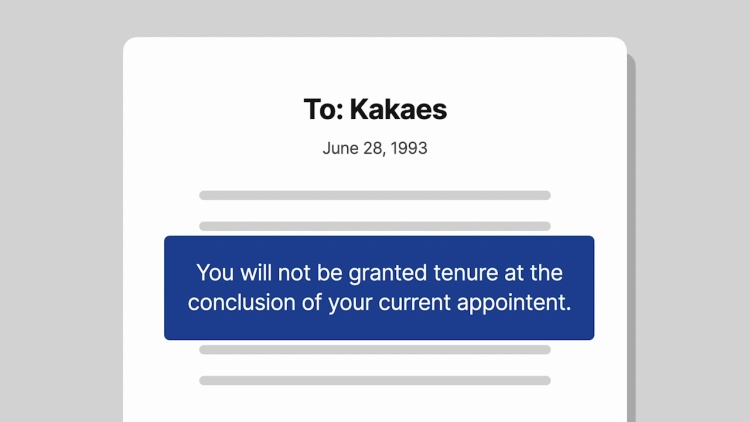Kakaes v. George Washington University
District of Columbia Court of Appeals
790 A.2d 581 (2002)
- Written by Jamie Milne, JD
Facts
Dr. Apostolos Kakaes (plaintiff) was an assistant professor at George Washington University (GW) (defendant). GW’s faculty code, which constituted a contract, stated that if an assistant professor was not going to be granted tenure at the end of the professor’s term, GW would notify the professor in writing no later than June 30 of the year before the professor’s term expired. If timely notice was not provided, the faculty code stated that the professor “shall acquire tenure at the end of the term.” Kakaes’s term was scheduled to end on May 30, 1994. On June 28, 1993, GW’s vice president wrote Kakaes a letter saying that Kakaes would not be granted tenure. However, the letter also stated that information was still being submitted to GW’s board of trustees for consideration on the tenure issue and Kakaes would be notified of the board’s decision as soon as possible. When Kakaes had not received a final decision by October 1993, he sued GW. He alleged that GW had not provided timely notice as to whether he would receive tenure and consequently, under the faculty code, he was entitled to tenure. While the suit was pending, GW denied tenure, and Kakaes’s term expired. At trial, Kakaes presented evidence of his lost salary for the second half of 1994 and the first half of 1995. The trial court concluded that GW breached the faculty code and awarded Kakaes $75,018. Kakaes appealed, arguing that the trial court should have required GW to grant him tenure.
Rule of Law
Issue
Holding and Reasoning (Schwelb, J.)
What to do next…
Here's why 911,000 law students have relied on our case briefs:
- Written by law professors and practitioners, not other law students. 47,100 briefs, keyed to 997 casebooks. Top-notch customer support.
- The right amount of information, includes the facts, issues, rule of law, holding and reasoning, and any concurrences and dissents.
- Access in your classes, works on your mobile and tablet. Massive library of related video lessons and high quality multiple-choice questions.
- Easy to use, uniform format for every case brief. Written in plain English, not in legalese. Our briefs summarize and simplify; they don’t just repeat the court’s language.





